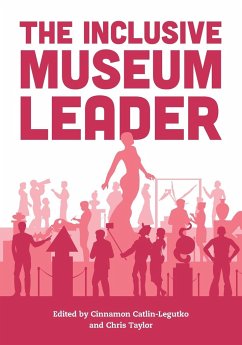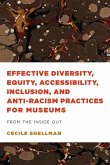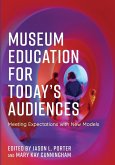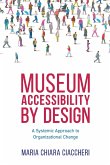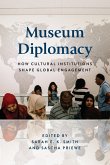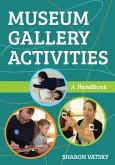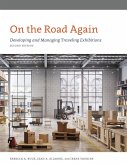The Inclusive Museum Leader
Herausgeber: Catlin-Legutko, Cinnamon; Taylor, Chris
The Inclusive Museum Leader
Herausgeber: Catlin-Legutko, Cinnamon; Taylor, Chris
- Broschiertes Buch
- Merkliste
- Auf die Merkliste
- Bewerten Bewerten
- Teilen
- Produkt teilen
- Produkterinnerung
- Produkterinnerung
The Inclusive Museum Leader offers insights and perspectives from two recognized museum leaders who have joined together to offer practical solutions and opportunities responding to the call for museums to play an active social justice role.
Andere Kunden interessierten sich auch für
![Effective Diversity, Equity, Accessibility, Inclusion, and Anti-Racism Practices for Museums Effective Diversity, Equity, Accessibility, Inclusion, and Anti-Racism Practices for Museums]() Cecile ShellmanEffective Diversity, Equity, Accessibility, Inclusion, and Anti-Racism Practices for Museums44,99 €
Cecile ShellmanEffective Diversity, Equity, Accessibility, Inclusion, and Anti-Racism Practices for Museums44,99 €![Museum Education for Today's Audiences Museum Education for Today's Audiences]() Museum Education for Today's Audiences58,99 €
Museum Education for Today's Audiences58,99 €![Museum Accessibility by Design Museum Accessibility by Design]() Maria Chiara CiaccheriMuseum Accessibility by Design57,99 €
Maria Chiara CiaccheriMuseum Accessibility by Design57,99 €![Museum Diplomacy Museum Diplomacy]() Sarah E.K. SmithMuseum Diplomacy65,99 €
Sarah E.K. SmithMuseum Diplomacy65,99 €![Museum Gallery Activities Museum Gallery Activities]() Sharon VatskyMuseum Gallery Activities51,99 €
Sharon VatskyMuseum Gallery Activities51,99 €![On the Road Again On the Road Again]() Rebecca BuckOn the Road Again48,99 €
Rebecca BuckOn the Road Again48,99 €![Museum Finance Museum Finance]() Brian AlexanderMuseum Finance43,99 €
Brian AlexanderMuseum Finance43,99 €-
-
-
The Inclusive Museum Leader offers insights and perspectives from two recognized museum leaders who have joined together to offer practical solutions and opportunities responding to the call for museums to play an active social justice role.
Hinweis: Dieser Artikel kann nur an eine deutsche Lieferadresse ausgeliefert werden.
Hinweis: Dieser Artikel kann nur an eine deutsche Lieferadresse ausgeliefert werden.
Produktdetails
- Produktdetails
- American Alliance of Museums
- Verlag: Rowman & Littlefield
- Annotated ed
- Seitenzahl: 326
- Erscheinungstermin: 5. Juli 2021
- Englisch
- Abmessung: 254mm x 178mm x 18mm
- Gewicht: 608g
- ISBN-13: 9781538152256
- ISBN-10: 1538152258
- Artikelnr.: 61506827
- Herstellerkennzeichnung
- Libri GmbH
- Europaallee 1
- 36244 Bad Hersfeld
- gpsr@libri.de
- American Alliance of Museums
- Verlag: Rowman & Littlefield
- Annotated ed
- Seitenzahl: 326
- Erscheinungstermin: 5. Juli 2021
- Englisch
- Abmessung: 254mm x 178mm x 18mm
- Gewicht: 608g
- ISBN-13: 9781538152256
- ISBN-10: 1538152258
- Artikelnr.: 61506827
- Herstellerkennzeichnung
- Libri GmbH
- Europaallee 1
- 36244 Bad Hersfeld
- gpsr@libri.de
Edited by Cinnamon Catlin-Legutko and Chris Taylor
Frontmatter Quotes Preface PART ONE - SETTING THE STAGE 1. With Fierce Intention by Joanne Jones-Rizzi (she
her) Black
bi-racial
queer
cisgender
no known disabilities 2. The Three-Body Problem of Museums by Cinnamon Catlin-Legutko (she
her) White
female
straight
cisgender
middle class
no known disabilities 3. Creating the Just Leader: Inclusive Leadership and Organizational Justice by Chris Taylor (he
him) biracial
male
straight
cisgender
no known disabilities 1. Two Change Agents, Two Cups of Coffee: A Conversation between Cinnamon Catlin-Legutko and Chris Taylor Cinnamon Catlin-Legutko and Chris Taylor Examining Implicit Bias Activity PART TWO - CHANGE IS REQUIRED 5. Anatomy of a Movement by Armando Perla (he
him) POC
Latinx
male
queer
cisgender
living with disabilities 6. How Should Inclusive Museum Leadership Respond to COVID-(16)19? by Omar Eaton-Martínez (he
him) Black Puerto Rican
male
straight
cisgender
no known disabilities 7. Hope is Not a Metaphor: An Annotated Guide to 25 Essential Skills for Museum Leaders by Lisa Yun Lee (she
her) Asian
female
straight
cisgender
no known disabilities 8. 2020: A Harsh Teacher for Leaders by Terri Lee Freeman (she
her) Black
female
cisgender
no known disabilities 9. Doing the Work: Because Checking the Box is not Enough by Dina A. Bailey (she
her) biracial
female
straight
cisgender
no known disabilities 10. To Be of Use and Beloved: A Conversation with Kelly McKinley Kelly McKinley (she
her) White
female
straight
cisgender
no known disabilities The Johari Window Activity PART THREE - INCLUSIVE LEADERSHIP 11. Dear White Colleague: Thoughts on Inclusive Museum Leadership from a Colleague of Color by Lisa Sasaki (she
her) Asian American
female
straight
cisgender
no known disabilities 12. Beyond a Scarcity Mindset: My Path Toward Inclusive Leadership by Ashley Rogers (she
her) White
female
cisgender
no known disabilities 13. Diary of a Woke Latina Leader by Susana Smith Bautista (she
her) White
Latina
female
straight
cisgender
no known disabilities Developing Self Awareness Activity 14. Motion Sickness: Care, Compassion, and the Future of Museums by Esme Ward White
female
straight
cisgender
no known disabilities 15. 8:46:40 by Devon M. Akmon (he
him) Arab American
male 16. Grounded in Community: A Conversation with Stacey Halfmoon Stacey Halfmoon (she
her) American Indian
female
straight
cisgender
no known disabilities The Ladder of Inference Activity PART FOUR - VALUES AND ACTION 17. Inclusive Design Centers Disabled People's Agency by Beth Ziebarth (she
her) disabled
female
white
straight
cisgender 18. Begin with the End in Mind: Inclusion as a Core Museum Practice by LaNesha DeBardelaben (she
her) Black
female
straight
cisgender
no known disabilities 19. Museum Leaders as Allies for Queer Inclusion by Margaret Middleton (they
them) White
genderqueer
no known disabilities 20. Leading Change at the Speed of Trust: A Conversation with Ben Garcia Ben Garcia (he
him) Latinx
cisgender
queer
no known disabilities Identifying Values Activity PART FIVE - CHOOSING YOUR ENVIRONMENT 21. How to Spot an Inclusive Leader and Choose to Work for Them by Kayleigh Bryant-Greenwell (she
her) Black
biracial
female
straight
cisgender
no known disabilities 22. Teaching the Change We Want to See: A Conversation with Faculty at Museum Training Programs Elizabeth Kryder-Reid (she
her) ¿White
female
straight
cisgender
no known disabilities Stacey Mann (she
her) White
female
cisgender
no known disabilities Therese Quinn (she
her
they
them) queer
cisgendered female
labeled White, aiming to be a race traitor
raised working class, still paycheck-to-paycheck Cynthia Robinson (she
her) White
female
straight
cisgender
no known disabilities Mattie Reynolds (she
her) Choctaw Nation of Oklahoma
female
straight Gretchen Sullivan Sorin (she
her) African American
female 23. Helping Boards to See Diversity, Equity, and Inclusion Clearly: A Conversation with Naree Viner Naree W.S. Viner (she
her) Asian
female
straight
cisgender
no known disabilities 24. Practical Ambition: Positioning Inclusive Board Member Ethic as Basic Board Duty by Tonya M. Matthews (she
her
dr) African-American
female
straight
cisgender
hidden disability 25. Building Inclusivity With and Within the Board by Lori Fogarty White
female
straight
cisgender
no known disabilities Taking Inventory Activity PART SIX - LOOKING AHEAD 26. What Kind of Ancestor Will I Be? by Bob Beatty (he
him) White
male
straight
cisgender
single-sided deafness from infancy 27. Stepping Out to Step In: A Conversation with nikhil trivedi nikhil trivedi (he
him) South Asian
male
straight
cisgender
no known disabilities
middle class
raised working class
Hindu
US citizen 28. A Call to Action: Putting Inclusion to Work by Robert 'Bert' Davis (he
him) African American
male
straight
cisgender
no known disabilities Developing Your Leadership Philosophy Activity End Matter Epilogue Author Bios
her) Black
bi-racial
queer
cisgender
no known disabilities 2. The Three-Body Problem of Museums by Cinnamon Catlin-Legutko (she
her) White
female
straight
cisgender
middle class
no known disabilities 3. Creating the Just Leader: Inclusive Leadership and Organizational Justice by Chris Taylor (he
him) biracial
male
straight
cisgender
no known disabilities 1. Two Change Agents, Two Cups of Coffee: A Conversation between Cinnamon Catlin-Legutko and Chris Taylor Cinnamon Catlin-Legutko and Chris Taylor Examining Implicit Bias Activity PART TWO - CHANGE IS REQUIRED 5. Anatomy of a Movement by Armando Perla (he
him) POC
Latinx
male
queer
cisgender
living with disabilities 6. How Should Inclusive Museum Leadership Respond to COVID-(16)19? by Omar Eaton-Martínez (he
him) Black Puerto Rican
male
straight
cisgender
no known disabilities 7. Hope is Not a Metaphor: An Annotated Guide to 25 Essential Skills for Museum Leaders by Lisa Yun Lee (she
her) Asian
female
straight
cisgender
no known disabilities 8. 2020: A Harsh Teacher for Leaders by Terri Lee Freeman (she
her) Black
female
cisgender
no known disabilities 9. Doing the Work: Because Checking the Box is not Enough by Dina A. Bailey (she
her) biracial
female
straight
cisgender
no known disabilities 10. To Be of Use and Beloved: A Conversation with Kelly McKinley Kelly McKinley (she
her) White
female
straight
cisgender
no known disabilities The Johari Window Activity PART THREE - INCLUSIVE LEADERSHIP 11. Dear White Colleague: Thoughts on Inclusive Museum Leadership from a Colleague of Color by Lisa Sasaki (she
her) Asian American
female
straight
cisgender
no known disabilities 12. Beyond a Scarcity Mindset: My Path Toward Inclusive Leadership by Ashley Rogers (she
her) White
female
cisgender
no known disabilities 13. Diary of a Woke Latina Leader by Susana Smith Bautista (she
her) White
Latina
female
straight
cisgender
no known disabilities Developing Self Awareness Activity 14. Motion Sickness: Care, Compassion, and the Future of Museums by Esme Ward White
female
straight
cisgender
no known disabilities 15. 8:46:40 by Devon M. Akmon (he
him) Arab American
male 16. Grounded in Community: A Conversation with Stacey Halfmoon Stacey Halfmoon (she
her) American Indian
female
straight
cisgender
no known disabilities The Ladder of Inference Activity PART FOUR - VALUES AND ACTION 17. Inclusive Design Centers Disabled People's Agency by Beth Ziebarth (she
her) disabled
female
white
straight
cisgender 18. Begin with the End in Mind: Inclusion as a Core Museum Practice by LaNesha DeBardelaben (she
her) Black
female
straight
cisgender
no known disabilities 19. Museum Leaders as Allies for Queer Inclusion by Margaret Middleton (they
them) White
genderqueer
no known disabilities 20. Leading Change at the Speed of Trust: A Conversation with Ben Garcia Ben Garcia (he
him) Latinx
cisgender
queer
no known disabilities Identifying Values Activity PART FIVE - CHOOSING YOUR ENVIRONMENT 21. How to Spot an Inclusive Leader and Choose to Work for Them by Kayleigh Bryant-Greenwell (she
her) Black
biracial
female
straight
cisgender
no known disabilities 22. Teaching the Change We Want to See: A Conversation with Faculty at Museum Training Programs Elizabeth Kryder-Reid (she
her) ¿White
female
straight
cisgender
no known disabilities Stacey Mann (she
her) White
female
cisgender
no known disabilities Therese Quinn (she
her
they
them) queer
cisgendered female
labeled White, aiming to be a race traitor
raised working class, still paycheck-to-paycheck Cynthia Robinson (she
her) White
female
straight
cisgender
no known disabilities Mattie Reynolds (she
her) Choctaw Nation of Oklahoma
female
straight Gretchen Sullivan Sorin (she
her) African American
female 23. Helping Boards to See Diversity, Equity, and Inclusion Clearly: A Conversation with Naree Viner Naree W.S. Viner (she
her) Asian
female
straight
cisgender
no known disabilities 24. Practical Ambition: Positioning Inclusive Board Member Ethic as Basic Board Duty by Tonya M. Matthews (she
her
dr) African-American
female
straight
cisgender
hidden disability 25. Building Inclusivity With and Within the Board by Lori Fogarty White
female
straight
cisgender
no known disabilities Taking Inventory Activity PART SIX - LOOKING AHEAD 26. What Kind of Ancestor Will I Be? by Bob Beatty (he
him) White
male
straight
cisgender
single-sided deafness from infancy 27. Stepping Out to Step In: A Conversation with nikhil trivedi nikhil trivedi (he
him) South Asian
male
straight
cisgender
no known disabilities
middle class
raised working class
Hindu
US citizen 28. A Call to Action: Putting Inclusion to Work by Robert 'Bert' Davis (he
him) African American
male
straight
cisgender
no known disabilities Developing Your Leadership Philosophy Activity End Matter Epilogue Author Bios
Frontmatter Quotes Preface PART ONE - SETTING THE STAGE 1. With Fierce Intention by Joanne Jones-Rizzi (she
her) Black
bi-racial
queer
cisgender
no known disabilities 2. The Three-Body Problem of Museums by Cinnamon Catlin-Legutko (she
her) White
female
straight
cisgender
middle class
no known disabilities 3. Creating the Just Leader: Inclusive Leadership and Organizational Justice by Chris Taylor (he
him) biracial
male
straight
cisgender
no known disabilities 1. Two Change Agents, Two Cups of Coffee: A Conversation between Cinnamon Catlin-Legutko and Chris Taylor Cinnamon Catlin-Legutko and Chris Taylor Examining Implicit Bias Activity PART TWO - CHANGE IS REQUIRED 5. Anatomy of a Movement by Armando Perla (he
him) POC
Latinx
male
queer
cisgender
living with disabilities 6. How Should Inclusive Museum Leadership Respond to COVID-(16)19? by Omar Eaton-Martínez (he
him) Black Puerto Rican
male
straight
cisgender
no known disabilities 7. Hope is Not a Metaphor: An Annotated Guide to 25 Essential Skills for Museum Leaders by Lisa Yun Lee (she
her) Asian
female
straight
cisgender
no known disabilities 8. 2020: A Harsh Teacher for Leaders by Terri Lee Freeman (she
her) Black
female
cisgender
no known disabilities 9. Doing the Work: Because Checking the Box is not Enough by Dina A. Bailey (she
her) biracial
female
straight
cisgender
no known disabilities 10. To Be of Use and Beloved: A Conversation with Kelly McKinley Kelly McKinley (she
her) White
female
straight
cisgender
no known disabilities The Johari Window Activity PART THREE - INCLUSIVE LEADERSHIP 11. Dear White Colleague: Thoughts on Inclusive Museum Leadership from a Colleague of Color by Lisa Sasaki (she
her) Asian American
female
straight
cisgender
no known disabilities 12. Beyond a Scarcity Mindset: My Path Toward Inclusive Leadership by Ashley Rogers (she
her) White
female
cisgender
no known disabilities 13. Diary of a Woke Latina Leader by Susana Smith Bautista (she
her) White
Latina
female
straight
cisgender
no known disabilities Developing Self Awareness Activity 14. Motion Sickness: Care, Compassion, and the Future of Museums by Esme Ward White
female
straight
cisgender
no known disabilities 15. 8:46:40 by Devon M. Akmon (he
him) Arab American
male 16. Grounded in Community: A Conversation with Stacey Halfmoon Stacey Halfmoon (she
her) American Indian
female
straight
cisgender
no known disabilities The Ladder of Inference Activity PART FOUR - VALUES AND ACTION 17. Inclusive Design Centers Disabled People's Agency by Beth Ziebarth (she
her) disabled
female
white
straight
cisgender 18. Begin with the End in Mind: Inclusion as a Core Museum Practice by LaNesha DeBardelaben (she
her) Black
female
straight
cisgender
no known disabilities 19. Museum Leaders as Allies for Queer Inclusion by Margaret Middleton (they
them) White
genderqueer
no known disabilities 20. Leading Change at the Speed of Trust: A Conversation with Ben Garcia Ben Garcia (he
him) Latinx
cisgender
queer
no known disabilities Identifying Values Activity PART FIVE - CHOOSING YOUR ENVIRONMENT 21. How to Spot an Inclusive Leader and Choose to Work for Them by Kayleigh Bryant-Greenwell (she
her) Black
biracial
female
straight
cisgender
no known disabilities 22. Teaching the Change We Want to See: A Conversation with Faculty at Museum Training Programs Elizabeth Kryder-Reid (she
her) ¿White
female
straight
cisgender
no known disabilities Stacey Mann (she
her) White
female
cisgender
no known disabilities Therese Quinn (she
her
they
them) queer
cisgendered female
labeled White, aiming to be a race traitor
raised working class, still paycheck-to-paycheck Cynthia Robinson (she
her) White
female
straight
cisgender
no known disabilities Mattie Reynolds (she
her) Choctaw Nation of Oklahoma
female
straight Gretchen Sullivan Sorin (she
her) African American
female 23. Helping Boards to See Diversity, Equity, and Inclusion Clearly: A Conversation with Naree Viner Naree W.S. Viner (she
her) Asian
female
straight
cisgender
no known disabilities 24. Practical Ambition: Positioning Inclusive Board Member Ethic as Basic Board Duty by Tonya M. Matthews (she
her
dr) African-American
female
straight
cisgender
hidden disability 25. Building Inclusivity With and Within the Board by Lori Fogarty White
female
straight
cisgender
no known disabilities Taking Inventory Activity PART SIX - LOOKING AHEAD 26. What Kind of Ancestor Will I Be? by Bob Beatty (he
him) White
male
straight
cisgender
single-sided deafness from infancy 27. Stepping Out to Step In: A Conversation with nikhil trivedi nikhil trivedi (he
him) South Asian
male
straight
cisgender
no known disabilities
middle class
raised working class
Hindu
US citizen 28. A Call to Action: Putting Inclusion to Work by Robert 'Bert' Davis (he
him) African American
male
straight
cisgender
no known disabilities Developing Your Leadership Philosophy Activity End Matter Epilogue Author Bios
her) Black
bi-racial
queer
cisgender
no known disabilities 2. The Three-Body Problem of Museums by Cinnamon Catlin-Legutko (she
her) White
female
straight
cisgender
middle class
no known disabilities 3. Creating the Just Leader: Inclusive Leadership and Organizational Justice by Chris Taylor (he
him) biracial
male
straight
cisgender
no known disabilities 1. Two Change Agents, Two Cups of Coffee: A Conversation between Cinnamon Catlin-Legutko and Chris Taylor Cinnamon Catlin-Legutko and Chris Taylor Examining Implicit Bias Activity PART TWO - CHANGE IS REQUIRED 5. Anatomy of a Movement by Armando Perla (he
him) POC
Latinx
male
queer
cisgender
living with disabilities 6. How Should Inclusive Museum Leadership Respond to COVID-(16)19? by Omar Eaton-Martínez (he
him) Black Puerto Rican
male
straight
cisgender
no known disabilities 7. Hope is Not a Metaphor: An Annotated Guide to 25 Essential Skills for Museum Leaders by Lisa Yun Lee (she
her) Asian
female
straight
cisgender
no known disabilities 8. 2020: A Harsh Teacher for Leaders by Terri Lee Freeman (she
her) Black
female
cisgender
no known disabilities 9. Doing the Work: Because Checking the Box is not Enough by Dina A. Bailey (she
her) biracial
female
straight
cisgender
no known disabilities 10. To Be of Use and Beloved: A Conversation with Kelly McKinley Kelly McKinley (she
her) White
female
straight
cisgender
no known disabilities The Johari Window Activity PART THREE - INCLUSIVE LEADERSHIP 11. Dear White Colleague: Thoughts on Inclusive Museum Leadership from a Colleague of Color by Lisa Sasaki (she
her) Asian American
female
straight
cisgender
no known disabilities 12. Beyond a Scarcity Mindset: My Path Toward Inclusive Leadership by Ashley Rogers (she
her) White
female
cisgender
no known disabilities 13. Diary of a Woke Latina Leader by Susana Smith Bautista (she
her) White
Latina
female
straight
cisgender
no known disabilities Developing Self Awareness Activity 14. Motion Sickness: Care, Compassion, and the Future of Museums by Esme Ward White
female
straight
cisgender
no known disabilities 15. 8:46:40 by Devon M. Akmon (he
him) Arab American
male 16. Grounded in Community: A Conversation with Stacey Halfmoon Stacey Halfmoon (she
her) American Indian
female
straight
cisgender
no known disabilities The Ladder of Inference Activity PART FOUR - VALUES AND ACTION 17. Inclusive Design Centers Disabled People's Agency by Beth Ziebarth (she
her) disabled
female
white
straight
cisgender 18. Begin with the End in Mind: Inclusion as a Core Museum Practice by LaNesha DeBardelaben (she
her) Black
female
straight
cisgender
no known disabilities 19. Museum Leaders as Allies for Queer Inclusion by Margaret Middleton (they
them) White
genderqueer
no known disabilities 20. Leading Change at the Speed of Trust: A Conversation with Ben Garcia Ben Garcia (he
him) Latinx
cisgender
queer
no known disabilities Identifying Values Activity PART FIVE - CHOOSING YOUR ENVIRONMENT 21. How to Spot an Inclusive Leader and Choose to Work for Them by Kayleigh Bryant-Greenwell (she
her) Black
biracial
female
straight
cisgender
no known disabilities 22. Teaching the Change We Want to See: A Conversation with Faculty at Museum Training Programs Elizabeth Kryder-Reid (she
her) ¿White
female
straight
cisgender
no known disabilities Stacey Mann (she
her) White
female
cisgender
no known disabilities Therese Quinn (she
her
they
them) queer
cisgendered female
labeled White, aiming to be a race traitor
raised working class, still paycheck-to-paycheck Cynthia Robinson (she
her) White
female
straight
cisgender
no known disabilities Mattie Reynolds (she
her) Choctaw Nation of Oklahoma
female
straight Gretchen Sullivan Sorin (she
her) African American
female 23. Helping Boards to See Diversity, Equity, and Inclusion Clearly: A Conversation with Naree Viner Naree W.S. Viner (she
her) Asian
female
straight
cisgender
no known disabilities 24. Practical Ambition: Positioning Inclusive Board Member Ethic as Basic Board Duty by Tonya M. Matthews (she
her
dr) African-American
female
straight
cisgender
hidden disability 25. Building Inclusivity With and Within the Board by Lori Fogarty White
female
straight
cisgender
no known disabilities Taking Inventory Activity PART SIX - LOOKING AHEAD 26. What Kind of Ancestor Will I Be? by Bob Beatty (he
him) White
male
straight
cisgender
single-sided deafness from infancy 27. Stepping Out to Step In: A Conversation with nikhil trivedi nikhil trivedi (he
him) South Asian
male
straight
cisgender
no known disabilities
middle class
raised working class
Hindu
US citizen 28. A Call to Action: Putting Inclusion to Work by Robert 'Bert' Davis (he
him) African American
male
straight
cisgender
no known disabilities Developing Your Leadership Philosophy Activity End Matter Epilogue Author Bios

